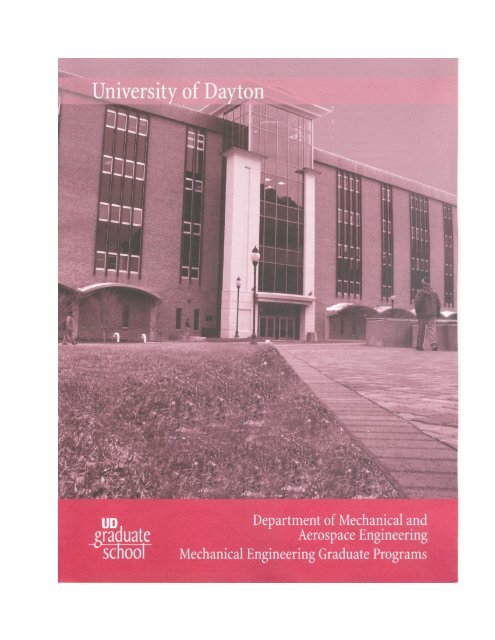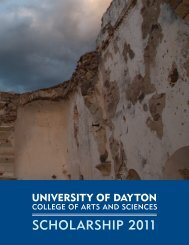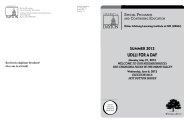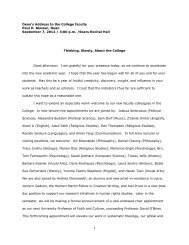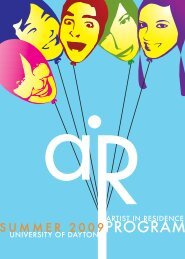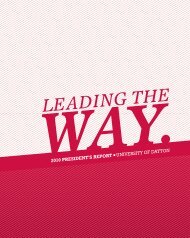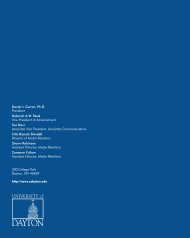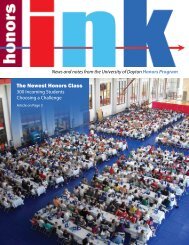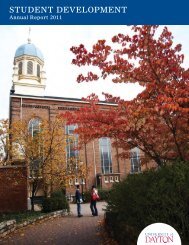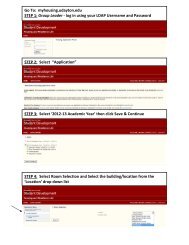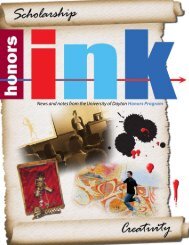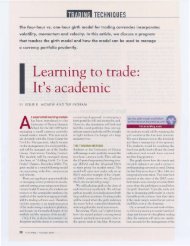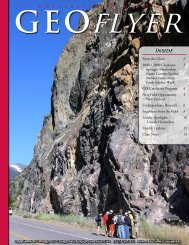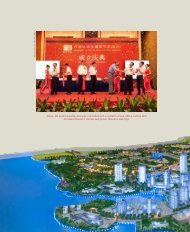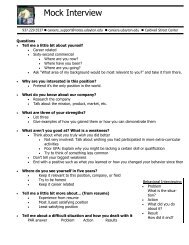Graduate Mechanical Engineering Program Brochure (PDF)
Graduate Mechanical Engineering Program Brochure (PDF)
Graduate Mechanical Engineering Program Brochure (PDF)
You also want an ePaper? Increase the reach of your titles
YUMPU automatically turns print PDFs into web optimized ePapers that Google loves.
University of Dayton <strong>Graduate</strong> School<br />
The University of Dayton offers more than 50 disciplinary and cross-disciplinary advanced<br />
degree programs, making it easy for you to find a program to meet your needs. We are<br />
committed to student success by providing excellent advanced educational opportunities and<br />
services that link learning, research and scholarship with the Catholic and Marianist values of the<br />
University of Dayton. In the Eugene W. Kettering building, we have a number of instructional<br />
and research laboratories where we blend hands-on learning and practical experience with the<br />
best in engineering scholarship. Our graduate program is rated 52nd nationally by U.S. News and<br />
World Report (2011).<br />
<strong>Mechanical</strong> <strong>Engineering</strong><br />
The Department of <strong>Mechanical</strong> and Aerospace <strong>Engineering</strong> provides a dynamic atmosphere for<br />
learning, growing, and developing well-rounded engineers, scholars, and professionals.<br />
<strong>Mechanical</strong> and Aerospace <strong>Engineering</strong> offers an avenue for the synthesis of principles of the<br />
physical sciences, mathematics, economics, and human relations. Engineers in these areas<br />
conceive, design and analyze a wide variety of products and systems.<br />
The department offers programs of study leading to a Master of Science (M.S.), Doctor of<br />
<strong>Engineering</strong> (D.E.) and Doctor of Philosophy (Ph.D.) in <strong>Mechanical</strong> <strong>Engineering</strong>. Research areas<br />
include:<br />
� Combustion<br />
� Design and manufacturing<br />
� Energy systems<br />
� Environmentally conscious design<br />
� Fluid mechanics<br />
� Fuels<br />
� Materials<br />
� Noise and vibration<br />
� Solid mechanics<br />
� Sustainable engineering<br />
� Thermal sciences<br />
� Tribology<br />
For the Master of Science in <strong>Mechanical</strong> <strong>Engineering</strong> the program of study must include a<br />
minimum of 30 semester hours approved by the student’s advisor, including:<br />
1. At least twelve semester hours in mechanical engineering courses to be selected from one of<br />
the following areas of concentrations.<br />
a. Thermo-Fluids<br />
b. Solid Mechanics<br />
c. Materials<br />
d. Design and Manufacturing<br />
2. Up to six semester hours of research as a thesis or a project. The thesis option requires<br />
both a written document and an oral defense.
3. Three semester hours of mathematics.<br />
4. Up to nine semester hours of electives, to be chosen from current course offerings which<br />
best suit the student’s requirements and approved by the student’s advisor.<br />
For a Doctor of Philosophy degree, students are required to take another 30 credit hours<br />
of course work and 30 hours of research leading to a dissertation.<br />
Admission Requirements<br />
If you are seeking admission to any of the graduate programs in <strong>Mechanical</strong> <strong>Engineering</strong>, you<br />
must have an undergraduate degree from an accredited program in engineering, physics, applied<br />
mathematics or other appropriate program of study. If you have a different undergraduate degree,<br />
you may be required to complete prerequisite courses. You should have at least a 3.0 cumulative<br />
grade point average (GPA) on a 4.0 scale for admission in to Masters program and 3.20 for<br />
doctoral program. You should submit the following information in addition to the online<br />
application:<br />
� An official academic record of all previously attended colleges or universities, which must<br />
be submitted directly from the colleges or universities to the Office of <strong>Graduate</strong> Admission<br />
Processing. Hand-carried transcripts, official copies marked Issued to Student and unofficial<br />
copies are not acceptable.<br />
� Three letters of recommendation from professors or employers.<br />
� A personal statement or résumé.<br />
� Results from the GRE are not required. However, you are welcome to submit a score in<br />
support of your application.<br />
Applying to UD<br />
To be considered for graduate admission, apply online at:<br />
http://gradadmission.udayton.edu/application/<br />
It’s simple, fast and free. After submitting your application, check your status online<br />
(http://gradadmission.udayton.edu/application/adm_status.asp) at any point during the process to<br />
see what pieces of information, if any, you may need to submit to UD. Enhance your experience<br />
by personalizing our Web site to view information about your academic interests, learn more<br />
about faculty and research opportunities, and receive important news and updates throughout the<br />
admission process.<br />
The UD Guide (http://gradadmission.udayton.edu/guide/) provides key information for graduate<br />
students covering topics such as housing and dining, parking, computer accounts, class<br />
registration, financial services and more.<br />
Cost<br />
The charges listed are for the 2011-12 academic year and are subject to change for the 2012-13<br />
academic year. Visit http://gradadmission.udayton.edu/afford/costs.asp for more information.<br />
<strong>Engineering</strong> (Master’s) $758 per credit hr.
<strong>Engineering</strong> (Ph.D.) $862 per credit hr.<br />
Financial Aid<br />
Teaching and research assistantships are available through the Department and the University of<br />
Dayton Research Institute. The majority of our full-time graduate students receive a teaching or<br />
research assistantship, which provides tuition plus a stipend. To applying for an assistantship,<br />
indicate your interest for an assistantship on the online admission application.<br />
Loans and grants are also available through the University of Dayton. You must be admitted to<br />
the University of Dayton to receive a formal financial aid award. For loan and grant<br />
consideration, you are required to submit the Free Application for Federal Student Aid (FAFSA),<br />
available from any college or the Web (http://www.fafsa.ed.gov). Submit this form to the<br />
processing agency and list the University of Dayton (CODE #003127) to receive the aid.<br />
Although financial aid information is processed throughout the year for graduate students, May 1<br />
is the priority consideration deadline. It is recommended that you submit your completed FAFSA<br />
to the processing agency by May 1 for financial aid consideration for the upcoming fall, winter<br />
and summer semesters.<br />
Other financial support includes scholarships and fellowships from organizations such as Ohio<br />
Space Grant Consortium, Clare Booth Luce Fellowship and Hans Von O’Hain Fellowship.<br />
Faculty<br />
Our dedicated faculty will mentor your progress as you develop your research and professional<br />
capabilities. Our faculty is nationally recognized for their academic, research and professional<br />
service contributions in their respective areas of emphasis. <strong>Graduate</strong> faculty include:<br />
Altman, Aaron, Ph.D.,<br />
Cranfield (England), 2001<br />
Research: Aircraft design, low Reynolds number<br />
aerodynamics, flapping wing flight, morphing aircraft,<br />
and configurational aerodynamics.<br />
Ballal, Dilip, Ph.D.,<br />
Cranfield (England), 1972<br />
Research: Gas turbine combustion and jet propulsion.<br />
Bigelow, Kimberly, Ph.D.,<br />
Ohio State University, 2008<br />
Research: Biomechanics.<br />
Camberos, Jose, Ph.D.<br />
Stanford University, 1995<br />
Research: Computational Electrodynamics,<br />
Theoretical and Applied Thermo–Fluid–Physics and<br />
Monte Carlo Methods<br />
Doyle, George R., Ph.D.<br />
University of Akron, 1973<br />
Ervin, Jamie S., Ph.D.,<br />
University of Michigan, 1991<br />
Research: Aviation fuel research, multiphase flow,<br />
fluid dynamic, and heat transfer.<br />
Hallinan, Kevin P., Ph.D.,<br />
Johns Hopkins University, 1988<br />
Research: Capillary flow, multiphase flow, phase<br />
change heat transfer.<br />
Jain, Vinod K., Ph.D.,<br />
Iowa State University, 1980<br />
Research: machine design, materials, manufacturing,<br />
tribology and fretting fatigue.<br />
Kashani, Reza, Ph.D.,<br />
University of Wisconsin-Madison, 1989<br />
Research: Power systems, power electronics, and<br />
energy conversion.<br />
Kissock, John K., Ph.D.,<br />
Texas A&M University, 1993<br />
Research: Industrial, building, and renewable energy<br />
systems.
Kumar, Binod, Ph.D.<br />
The Penn State University, 1976<br />
Research: Fuel cell and rechargeable lithium<br />
batteries<br />
Lafdi, Khalid, Ph.D., D.Sc.,<br />
France, 1988 and 1991<br />
Research: Nanocomposites processing, carbon foams,<br />
and ceramics.<br />
Murray, Andrew P., Ph.D.,<br />
University of California, 1996<br />
Research: Kinematics, kinematic principles in design,<br />
mechanical systems analysis, and design.<br />
Petrykowski, John, Ph.D.,<br />
Illinois, 1981<br />
Research: Fluid mechanics, mathematical methods,<br />
mechanics, and heat transfer.<br />
Pinnell, Margaret F., Ph.D.,<br />
University of Dayton, 1995<br />
Research: Pedagogy, service-learning, materials,<br />
aging aircraft, composite materials.<br />
Rumpfkeil , Markus, Ph.D.<br />
University of Toronto, 2008<br />
Research: Computational Fluid Dynamics<br />
Schauer, John J., Ph.D.,<br />
Stanford University, 1964<br />
Research: Heat and mass transfer, advanced<br />
engineering analysis, and acoustics.<br />
Sidhu, Sukh, Ph.D.,<br />
University of Illinois, 1992<br />
Research: Particulate and gaseous combustion<br />
emissions.<br />
Zabarnick, Steven S., Ph.D.,<br />
Energy and Environmental <strong>Engineering</strong> Division<br />
Bldg 490, WPAFB


